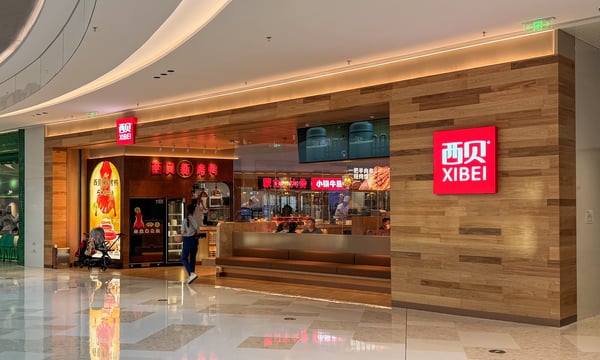On September 10, prominent entrepreneur and influencer Luo Yonghao publicly criticized a well-known restaurant chain, Xibei, on Weibo, a leading Chinese social media platform. Luo shared his “disgusting” dining experience and alleged that most dishes in the restaurant were pre-made, despite being expensive. He further called for government legislation mandating restaurants to disclose whether pre-made dishes are used.
Facing the criticism, Jia Guolong, Xibei’s founder, immediately responded with denial and even declared his intention to sue Luo. Following Jia’s order, Xibei outlets nationwide opened their kitchens to the public to prove their innocence. However, the move backfired: under the media’s lens, chefs were tearing open vacuum-sealed packs to grill pre-marinated fish with an 18-month shelf life, “cooking” chicken soup from concentrate with a 10-month shelf life, and preparing “healthy children’s meals” using frozen broccoli with a 24-month shelf life. The public access to Xibei’s kitchens also revealed that they operate without open-flame stoves, relying entirely on induction cookers for frying dishes.
Xibei’s longstanding reputation and brand image were seriously damaged, with netizens deriding its “self-destructive clarification.”
In response, on September 12, Luo started a livestreaming session on multiple platforms, stating that he was “not opposing pre-made dishes,” but instead “promoting transparency in pre-made dishes, and protecting consumers’ right to truth.” On Douyin, over 100,000 viewers gathered within 10 minutes, and nearly 5 million viewers were attracted on Weibo in less than half an hour.
On September 15, Xibei finally issued a public apology on Weibo, admitting that it had failed to meet customers’ expectations. The restaurant chain pledged to shift from central kitchen production to on-site food preparation in its outlets whenever possible.
The Debate Over the Definition of ‘Pre-made Dishes’
Does Xibei really sell mostly “pre-made dishes,” as Luo claimed?
On March 18, 2024, a notice issued by the State Administration for Market Regulation and five other authorities defined pre-made dishes as industrially processed food using one or more edible agricultural products, without preservatives and with or without seasonings. These dishes must meet the storage, transportation and sales conditions indicated on the product label and are intended to be consumed after heating or cooking. During a subsequent briefing to the press shortly after the notice was released, an official in charge clarified that dishes prepared in restaurants’ central kitchens are not classified as pre-made dishes.
However, the general public’s understanding of pre-made dishes may differ from the official national standard. For most consumers, any dishes made in advance, not freshly cooked on the spot, could be regarded as pre-made dishes.
In recent years, fueled by fast-paced urban lifestyles and rising living costs, pre-made dishes have gained popularity among consumers in China due to their convenience and affordability. According to the Pre-made Food Industry Development Report published by the People’s Daily Research Institute in 2023, the market size of pre-made food reached 419.6 billion yuan (around $59 billion) in 2022, representing a year-on-year growth of 21.3 percent. It is projected to top 1 trillion yuan (around $140 billion) by 2026.
That said, pre-made dishes are mostly valued for their convenience and low costs. When paying high prices to dine in restaurants, consumers naturally expect freshly cooked dishes with high-quality ingredients. Xibei’s use of concentrated chicken soup and pre-marinated frozen fish clearly falls short of the public’s expectations for genuinely good food.
Moreover, an important cultural factor is at play: Chinese culinary traditions attach great importance to dishes that are freshly prepared and cooked over high heat with strong wok aromas, a characteristic known as 锅气 (“guo qi” in Mandarin or “wok hei” in Cantonese). Xibei’s use of induction cookers was thus a cause of controversy in itself.
Xibei has defended itself by arguing that induction cookers are necessary since shopping malls prohibit open-flame stoves. However, through consultation with a former firefighter and a review of relevant regulations, such as the Standards for the Design of Dietetic Buildings and Rules for Fire Safety Management of Large-Scale Commercial Complexes, an architect concluded that the regulations do not prohibit the use of open flames in shopping malls.
The dispute between Luo and Jia may have highlighted wok hei and the specific definition of pre-made dishes, but it ultimately highlighted two deeper issues: food safety and consumers’ right to know.
Food Safety
For the Chinese public, food safety has long been a major concern, owing to a series of alarming incidents: this year’s lead poisoning incident among kindergarten children in Tianshui, Gansu; the 2024 scandal over shared transportation tanks for both fuel and cooking oil; and the 2008 melamine-contaminated infant milk powder.
China has established legislation to address this issue. For example, the Food Safety Law enacted on June 1, 2009, outlines a comprehensive legal framework for food safety. The revised implementation regulations of the Food Safety Law, which came into effect on December 1, 2019, introduced stricter penalties for food safety violators.
For pre-made dishes, the notice mentioned above explicitly highlights the importance of promoting the development of a standardized system and strengthening food safety supervision.
With a robust legal framework in place, the root of the problem lies in enforcement. At the top, the diffusion of responsibility for food safety supervision results in fragmented authority. At the local level, officers are not motivated to enforce regulations rigorously, and may even seek personal gains from businesses. Moreover, for small and medium-sized enterprises, which account for over 90 percent of China’s catering businesses, food safety management still requires further improvement.
Despite the public backlash against Xibei, there has not been a single food safety problem discerned and reported so far regarding the food served by the restaurant chain. Also, large food enterprises usually operate with safeguarded equipment and processes, so in this case there is no need for excessive concern about the safety of pre-made dishes.
Food safety has become tied to this incident only because the public has become sensitive, and many Chinese consumers still lack confidence in the use of pre-marinated and/or frozen ingredients due to the long industrial process for freezing, preservation, transportation, and thawing.
Consumers’ Right to Know
Article 8 of the Law on the Protection of Consumer Rights and Interests stipulates that “Consumers shall have the right to obtain true information on the commodities purchased or used or the services received.” The notice on pre-made dishes promotes clear labelling to safeguard consumers’ right to know and choose.
With the slogan “For families with kids, Xibei is the choice,” Xibei has stood out in the fiercely competitive restaurant market, even with comparatively higher prices. But its habit of secretly using frozen ingredients with up to a 24-month shelf life undoubtedly violated consumers’ rights to true information. This has destroyed consumers’ trust in its brand and standards.
For consumers, it is irrelevant whether these items fall within the official definition of pre-made dishes; they are also unconvinced by the argument that frozen broccoli could preserve nutrients even better. What really matters is transparency, which allows them to know what they are offered and hence make informed choices.
Conclusion
The Xibei incident highlights a cultural conflict between traditional methods of preparing dishes (i.e., chopping with cleavers and cooking over fire) and modern industrial techniques (i.e., cutting with scissors and heating with electricity). It has also sparked a national conversation about the role and standards of pre-made dishes in China’s food market, the enduring concerns surrounding food safety, and consumers’ right to know.
Amid the public controversy, as reported on September 13, the draft of the National Food Safety Standards for Pre-made Dishes, led by the National Health Commission, has passed expert review and will soon be released for public comments. The standards will specify materials, processing, storage, transport and inspection methods, with stronger safety requirements and clearer legal grounds for enforcement. The draft standards will require restaurants to disclose whether and how they use pre-made dishes.
As noted by Xinhua, China’s state media, “Breaking the trust deadlock requires joint efforts from multiple parties.” Moving forward, to ensure the safety of pre-made food in China, government departments should strengthen cooperation, strictly enforce laws, and resolutely crack down on violations and illegal activities. Industry players must strengthen employees’ professional knowledge and conduct, embrace transparency and uphold safety standards.






